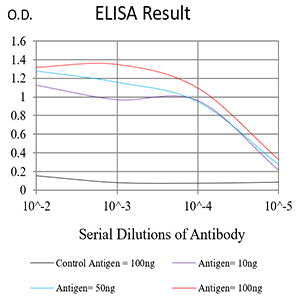
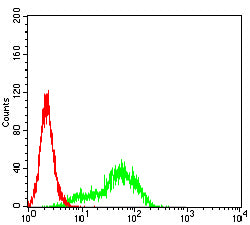
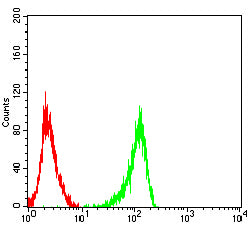
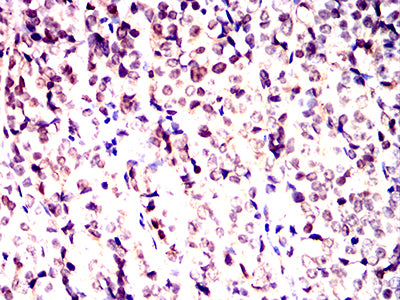
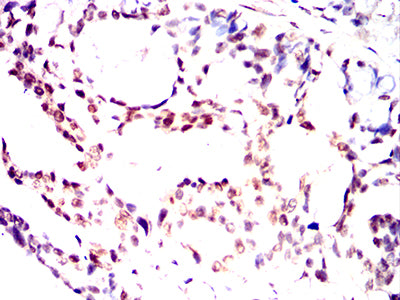
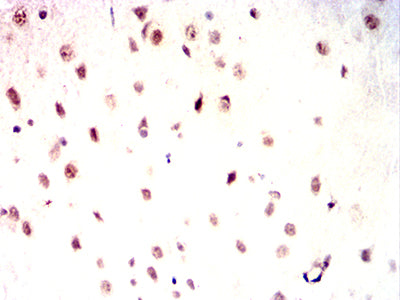
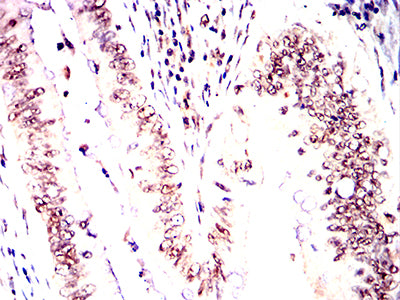
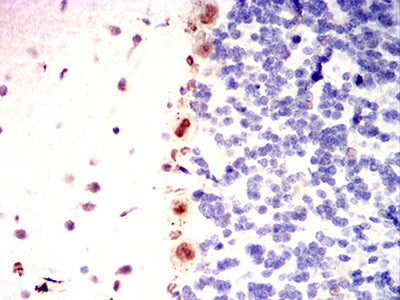
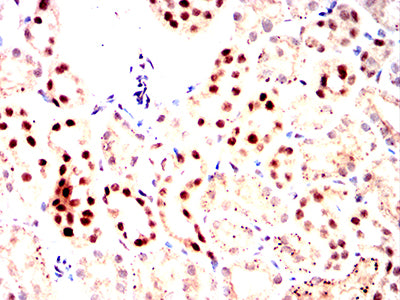
| WB | 咨询技术 | Human,Mouse,Rat |
| IF | 咨询技术 | Human,Mouse,Rat |
| IHC | 1/200 - 1/1000 | Human,Mouse,Rat |
| ICC | 技术咨询 | Human,Mouse,Rat |
| FCM | 1/200 - 1/400 | Human,Mouse,Rat |
| Elisa | 1/10000 | Human,Mouse,Rat |
| Aliases | ATLD; HNGS1; MRE11A; MRE11B |
| Entrez GeneID | 4361 |
| clone | 4D2B6 |
| WB Predicted band size | 80.6kDa |
| Host/Isotype | Mouse IgG1 |
| Antibody Type | Primary antibody |
| Storage | Store at 4°C short term. Aliquot and store at -20°C long term. Avoid freeze/thaw cycles. |
| Species Reactivity | Human, Rat |
| Immunogen | Purified recombinant fragment of human MRE11 (AA: 182-582) expressed in E. Coli. |
| Formulation | Purified antibody in PBS with 0.05% sodium azide |
+ +
以下是关于MRE11抗体的3篇参考文献及其摘要:
1. **"MRE11 expression as a biomarker of DNA damage response in breast cancer"**
*Authors: Kijas AW, Harris JL, Harris JM, et al.*
摘要:本研究通过开发高特异性MRE11抗体,分析了乳腺癌组织中MRE11蛋白的表达水平,发现其与DNA损伤修复缺陷及患者预后显著相关,提示MRE11可作为乳腺癌治疗的潜在生物标志物。
2. **"Functional characterization of MRE11 mutations in ataxia-telangiectasia-like disorder"**
*Authors: Stracker TH, Roig I, Knobel PA, et al.*
摘要:利用MRE11抗体进行免疫沉淀和免疫荧光实验,揭示了MRE11基因突变导致其核定位异常及核酸酶活性丧失,从而引发基因组不稳定性和神经退行性表型。
3. **"The role of MRE11-RAD50-NBS1 complex in homologous recombination repair"**
*Authors: Uhlmann F, Lichten M, Hartsuiker E.*
摘要:通过MRE11抗体阻断实验,证明MRE11蛋白复合物在DNA双链断裂修复中通过调控核酸内切酶活性促进同源重组,为靶向DNA修复通路的抗癌策略提供依据。
4. **"Antibody-based profiling of MRE11 in colorectal cancer subtypes"**
*Authors: Lee SE, Kim HS, Park PJ, et al.*
摘要:采用新型MRE11抗体对结直肠癌组织进行免疫组化分析,发现微卫星不稳定性(MSI)亚型中MRE11表达显著升高,提示其与错配修复通路存在功能关联。
The MRE11 antibody is a crucial tool in molecular biology and cancer research, targeting the MRE11 protein encoded by the *MRE11A* gene. MRE11 forms the MRE11-RAD50-NBS1 (MRN) complex, a central player in DNA damage response (DDR), particularly in repairing double-strand breaks (DSBs) via homologous recombination (HR) and non-homologous end joining (NHEJ). This nuclease also activates cell cycle checkpoints and stabilizes replication forks. Antibodies against MRE11 enable detection of its expression, localization, and post-translational modifications in cells and tissues, using techniques like immunoblotting, immunofluorescence, and immunohistochemistry.
In cancer research, MRE11 antibodies help assess DDR deficiencies linked to genomic instability and tumorigenesis. Reduced MRE11 expression or mutations correlate with poor prognosis in cancers (e.g., breast, ovarian) and sensitivity to therapies like PARP inhibitors or radiation. Dysfunctional MRE11 is also implicated in hereditary disorders such as ataxia-telangiectasia-like disorder (ATLD) and Nijmegen breakage syndrome. Researchers use these antibodies to study MRN complex dynamics, interactions with DDR proteins (e.g., BRCA1. ATM), and responses to genotoxic agents. Additionally, MRE11 antibodies serve as biomarkers in clinical studies to stratify patients for targeted therapies or predict treatment resistance. However, variability in antibody specificity requires careful validation to avoid cross-reactivity with homologous proteins. Overall, MRE11 antibodies are indispensable for unraveling DNA repair mechanisms and advancing precision oncology.
×